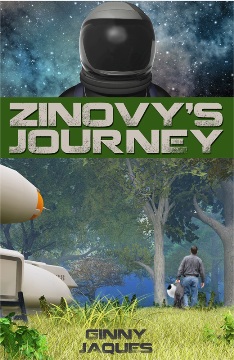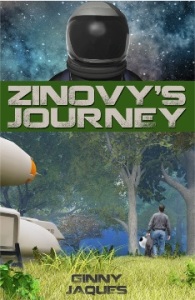 Ginny Jaques is a Canadian author whose debut novel, Zinovy’s Journey, released in October 2011. I first read the opening of an earlier draft of the story in an online contest put on by Marcher Lord Press. Readers were the judges, and the winner got published. I don’t remember who won, but I was disappointed when this story about a guy named Zinovy didn’t make it. I really liked the author’s style.
Ginny Jaques is a Canadian author whose debut novel, Zinovy’s Journey, released in October 2011. I first read the opening of an earlier draft of the story in an online contest put on by Marcher Lord Press. Readers were the judges, and the winner got published. I don’t remember who won, but I was disappointed when this story about a guy named Zinovy didn’t make it. I really liked the author’s style.
Janet: Welcome, Ginny, and thanks for taking time to join us. I don’t remember how we eventually connected, but I’m glad we did—and glad Zinovy’s full story is now available.
Ginny: I don’t remember when we first met either. It’s funny how you meet people in situations that you don’t know are going to be significant, so you don’t mark the date on your calendar! I know it was through the Marcher Lord Press contest Jeff sponsored in 2009.
Janet: Tell us a bit about Zinovy’s Journey.
Ginny: Zinovy’s Journey is a speculative novel about a Russian cosmonaut who is preparing to shuttle down to Cape Canaveral from an international space station when the earth below is destroyed in a nuclear holocaust. He’s used to being in charge of his life, but now he’s caught in circumstances that are totally beyond his control. The book chronicles his journey toward acceptance of the truth that he cannot be his own god, and the realization that there’s Someone else, who’s been walking beside him all the time, who is much better qualified to fill that position in his life.
Janet: Where did the story idea come from?
Ginny: The idea came out of one of those “What if. . .?” questions that sometimes send writers off on interesting journeys. I thought, what if, when Jesus comes back to establish His kingdom on earth, there are people away from the world at the time? What would they see, from wherever they were? What would they do? The opening conflict, and the beginnings of a plot scheme developed naturally from that point on.
Janet: Was the Marcher Lord Press contest the manuscript’s first exposure?
Ginny: Yes, the MLP contest was Zinovy’s first exposure. I’d pitched the manuscript to a few editors before, but Jeff was the first one who really listened and expressed an interest in the idea. I had scheduled an appointment with him at the American Christian Fiction Writers conference in Denver, mainly to get advice about who else I might approach. He’d just introduced the MLP contest, and invited me to submit. It was the beginning of the boost I needed to go for publication.
Janet: You chose to self-publish Zinovy’s Journey, with skilled advisers at every step of the way. What sorts of things would have gone wrong if you’d tried it on your own?
Ginny: I honestly wouldn’t have been able to do this on my own. There were just too many things I didn’t know. I knew some things I’d need, like a book cover, and typesetting, but I had no idea where to begin looking for them. Jeff Gerke was encouraging about the manuscript from the start, and he kind of fell into the position of my self-publishing consultant. I’d e-mail him with questions and he’d send back the answers, along with encouragement to go ahead and try things myself. He was literally a God-send.
Janet: I think the biggest danger of self-publishing is not knowing what questions to ask. Well, second-biggest. The biggest is thinking one’s work is perfect as-is and deciding one doesn’t need an editor. You successfully avoided both. Having gone this route, do you expect to do the same with your next novel? There will be a next one, right?
Ginny: Yes, you’re right. If you know the questions, you can find the answers, but if you don’t even know the questions you’re stuck. But it’s gotten easier to self-publish knowledgeably, even since last year when I began this project. There’s so much information out there now.
As for the “perfect as-is” manuscript, it doesn’t take much probing to discover that your work isn’t perfect. If you can’t see it, there will always be people eager to show you!
And about a next novel, no, I don’t have plans. I’m still recovering from this one.
Janet: Recovering. I hear you. What got you started writing?
Ginny: Actually, it was this story that got me started. Unlike other authors, I’ve never had a driving ambition to be a writer. Writing is such hard work, and I’m not highly motivated to do hard work! I would never have done this if the story hadn’t just insisted that I tell it. I’m ashamed to say that, but it’s the truth.
Janet: Writing is definitely something where you have to be motivated or you’ll never get to the end of the first draft. Okay, I’m going to ask a question I personally hate answering. Feel free to pass. What’s the novel’s theme? Or what one key thing do you want readers to take away when they’re done?
Ginny: The theme. Hmm. There are several, but the central one probably has to do with personal freedom—the freedom God grants us to choose our own eternal destiny. We can’t control our circumstances, but I do believe we are in control of how we respond to them—how we allow ourselves to see God in them. I want readers to come away from the story realizing that they have the option of responding to God’s love, and that the choices they make regarding this opportunity are of eternal significance.
Janet: May they see the choice and choose carefully! I know the novel’s just released, but what has reader response been like so far?
Ginny: Reader response has been encouraging. Surprisingly so. I’m pleased that people of both genders and all ages have reacted positively to the book. Even people who are not religious appreciate the story, which pleases me even more. It’s a Christian story, bottom line, but non-Christians have always been my target audience.
Janet: Is there a particular song or Scripture verse that’s made a big difference for you?
Ginny: I’ve always loved the song, “Trust and Obey.” I think it totally sums up the way we should live our lives. It’s the way I’ve tried to walk on this writing journey, just taking one step of faith at a time. I don’t think there is any other way this book could have happened.
Janet: What do you like best about the writing life?
Ginny: Tee hee. See comments above, under what got me started! The thing I like best about the writing life is when the manuscript is done and I can quit. It’s kind of like banging your head against the wall. More positively, I suppose, it’s the sense of satisfaction you get from the finished product. And a chance to curl up with someone else’s good book instead of having to work on your own.
Janet: Ah. “It feels so good when you stop.” I get it. What do your family think of your writing?
Ginny: My family has always been supportive of my writing, but it’s been tough love. They are my most honest critics. It’s probably a good thing that none of them read the whole thing before it was published. I might still be revising! My husband has been very patient with the process, and he fed and clothed me while I wrote. I couldn’t have done it without him.
Janet: Writers are told to read widely and voraciously. I think that’s one of the perks of the deal. What are you reading these days?
Ginny: I read a variety of books. When I’m writing, I try to read authors whose writing styles I admire, because I tend to mimic the style of the writing I’m reading. But now that I’m through writing, I can play around a bit. I just finished Decision Points, George Bush’s autobiography. I wanted to get his perspective on his presidency and it was a great read. Right now I’m reading Helen of Troy, a historical novel written by Margaret George, a delightful writer I met at the Surrey International Writer’s Conference in October. I’ve got a stack of books by my bed and I’m working my way down.
Janet: What do you like to do to get away from it all?
Ginny: I love to go to places that are warm and sunny. We usually go to Los Angeles in the spring to visit relatives, and I soak up the sounds and sights and smells of California. I’m originally a California girl, so the nostalgia is an added bonus.
Janet: What’s the most surprising/fun/zany/scary thing you’ve ever done?
Ginny: I honestly never have done anything surprising/fun/zany or scary, other than self-publish this book. Unless you count spending 20 years as a high school substitute teacher. That might qualify. I’m actually a very boring person. I suppose it’s not very good marketing to say that. Zinovy is much more interesting than I am, though.
Janet: That’s probably true of most writers. We’re alive, but our characters are a bit larger than life. Who wants to read about “normal”? And as a writer, I think taking on the whole independent publishing thing is pretty scary. [Substitute teaching sounds downright terrifying to me. I remember some of my classmates!] I’m curious what prompted a female Canadian author to choose a Russian man as her protagonist. Zinovy’s story could be anyone’s story, from anywhere, and we’re so overloaded with North American protagonists. He makes a refreshing change.
Ginny: I chose a Russian male to be the main character in the novel because I wanted someone who had no Christian background. It intrigued me to think how strange the new world would seem to someone who had no concept of the Kingdom of God. I figured a Russian KGB assassin would be about as far away from that kingdom as anyone could get. I’ve also never really seen myself as a Canadian writer. I’ve lived half my life in the U.S. and half in Canada, so I have more of an international perspective. That worked well for this novel. I agree that Zinovy is really everyman/everywoman. We all are on a heroic journey, looking for God, whether we know it’s Him we’re hungry for or not, and that kind of journey isn’t restricted to national boundaries.
Janet: Thanks so much for taking time to let us get to know you a bit, Ginny. May the LORD continue to bless you and make you a blessing to others—in every area of your life. And may He use Zinovy’s Journey to get many readers thinking about their own life choices.
Ginny: God bless you too, Janet. You’re a gift, and I’m so glad God gave me your friendship.
Janet: Someday we will yet meet in person!
===

When the world ends…
Zinovy’s journey begins.
To view the trailer for Zinovy’s Journey or to read a sample chapter, visit the Zinovy’s Journey website. And here’s a link to my review of Zinovy’s Journey.
To learn more about Ginny Jaques, visit her at Something About the Joy and Something About the Writing Journey.
Like this:
Like Loading...





